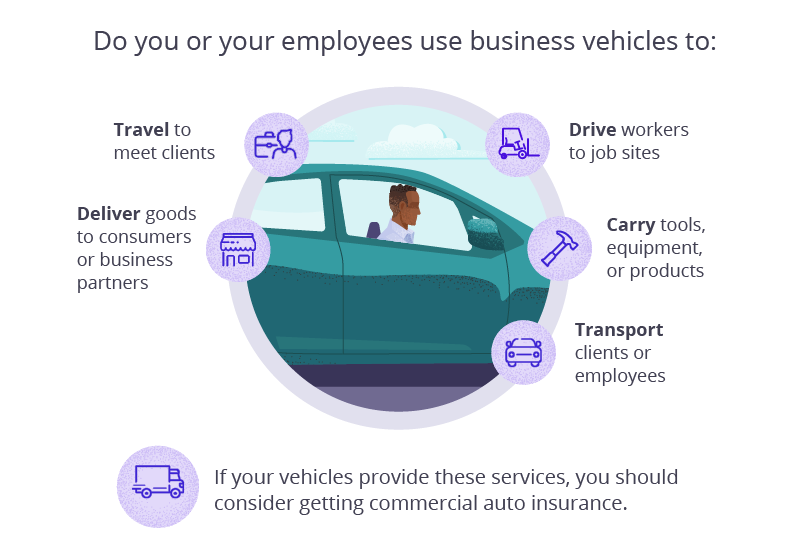
Commercial auto insurance for contractors and construction businesses
Commercial auto insurance covers legal bills, medical expenses, and property damage if a vehicle owned by your construction or contracting business is involved in an accident.
Commercial auto insurance covers the vehicles you depend on
Commuting from the head office to job sites exposes small construction and contracting businesses to a high level of risk. A collision could lead to another motorist getting injured, or expensive repairs for your construction truck or van.
An auto accident could cost your small business hundreds of thousands of dollars, especially if another person is injured. Compare that to the average annual premium of $2,157 for a general contractor, or $2,075 for a roofer, and it’s easy to see why commercial auto insurance is the better deal.
How does commercial auto insurance protect your business?
Commercial auto insurance can help cover the cost of lawsuits, property damage, medical payments, and other expenses that arise from an accident. It also pays for vehicle damage caused by weather or vandalism, along with vehicle theft.
This policy can be tailored to fit the unique needs of a construction company or contractor. For example, a plumber's van that is rarely used may need less coverage than a painter’s car that is driven daily.

Who needs commercial vehicle insurance?
Company-owned vehicles must be covered by commercial auto insurance.
Commercial auto coverage may be required if you:
- Operate a construction or contracting vehicle
- Transport tools and equipment
- Send employees on errands during work hours
State regulations determine how much coverage you need. Your commercial auto insurance must meet your state’s liability insurance requirements.
Find commercial auto insurance requirements in your state

What coverage can commercial auto provide for construction businesses?
You can tailor your commercial auto insurance policy to meet the needs of your construction or contracting enterprise, whether your specialty is carpentry, landscaping, or commercial building. This policy offers several coverage options, including:
Legal expenses
If your masonry business or other construction company is sued over an auto accident, legal fees can get out of hand fast. You may also end up paying for a settlement or court-ordered judgment out-of-pocket if not insured.
Medical expenses
If the driver of your welding business vehicle is injured, along with any passengers, this policy can cover the cost of medical care.

Collision
Collision coverage pays for damage to your construction truck, SUV, or other type of vehicle, no matter who is at fault.
Motorists without insurance
Underinsured motorist coverage / uninsured motorist coverage can help pay for damage caused by drivers who are carrying less than the required amount of insurance, or who do not have any coverage.
Non-collision damages
A comprehensive business auto insurance policy can pay for non-collision damages, including vandalism, theft, and fire.
Personal or rented vehicles may need additional coverage
Commercial auto insurance only covers business-owned vehicles, but sometimes employees drive their own cars for business purposes.
Business use is the main exclusion for a personal auto insurance policy. Hired and non-owned auto insurance (HNOA) offers liability coverage for construction professionals who get into an accident while driving their personal vehicle to conduct company business. It also covers leased or rented vehicles.
How much does commercial auto insurance for construction businesses cost?

Insureon’s construction and contracting professionals pay an average of $173 per month for commercial auto insurance.
Insurance costs for construction professionals are based on a few factors, including:
- The type of construction and contracting services offered
- Number of covered vehicles and driving records
- Business revenue and number of employees
- Where you operate
- Coverage limits and deductibles
Other policies for construction and contracting businesses to consider
While auto liability insurance is crucial for small businesses that depend on a car, van, or truck, it does not cover risks beyond those related to your vehicle. Owners of construction and contracting businesses should also consider:
General liability insurance: Covers legal expenses related to client bodily injuries and property damage, such as a contractor sued for damaging a valuable antique in a client's home.
Business owner's policy: Bundles general liability coverage and commercial property insurance at a discount. It protects against the most common lawsuits and property damage.
Workers’ compensation insurance: Pays for medical costs for work-related injuries and illnesses. Most states require this coverage for businesses with employees. It can also provide protection for sole proprietors and independent contractors.
Contractor’s tools and equipment insurance: Helps pay for repair or replacement of a contractor’s equipment and tools if they are lost, stolen, or damaged.
Professional liability insurance: Covers professional mistakes and oversights, such as a contractor missing a deadline for a project.
Surety bonds: Reimburses your clients for financial losses if your company is unable to fulfill the terms of its contract.
Builder’s risk insurance: Pays for physical damage done to a structure still under construction, such as a fire or vandalism at a construction site.
Mobile equipment endorsement: Extends your car insurance coverage to include “non-auto” mobile equipment, such as a tractor, excavator, or forklift, while it’s towing equipment of being driven on a public road.
Contractors pollution liability (CPL) insurance: A type of environmental insurance that covers pollution liability risks for contractors and their subcontractors.
Additional insured endorsement: Extends coverage to anyone other than the policyholder, and can be required by clients, contractors, and subcontractors depending on the project or contract.
Get free quotes and buy online with Insureon
Are you ready to safeguard your construction vehicle with commercial auto insurance? Complete Insureon’s easy online application today. Once you find the right, affordable policy, you can begin coverage and get your certificate of insurance in less than 24 hours.
What our customers are saying

Want free expert advice right in your inbox?
By entering your email address and subscribing, you agree to our Terms of Use and Privacy Policy




























